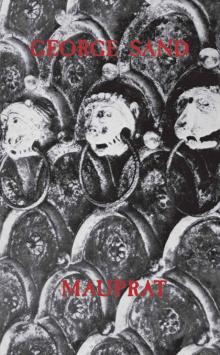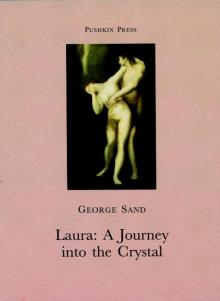- Home
- George Sand
Mauprat Page 2
Mauprat Read online
Page 2
The writings of George Sand’s second period, which extends from 1840 to 1848, are of a more general character, and are tinged with a generous but not very enlightened ardour for social emancipation. Of these novels, the earliest is “Le Compagnon du Tour de France” (1840), which is scarcely a masterpiece. In the pursuit of foreign modes of thought, and impelled by experiences of travel, George Sand rose to far greater heights in “Jeanne” {1842), in 44 Consuelo” (1842-43), and in “La Comtesse de Rudolstadt” (1844). All these books were composed in her retirement at Nohant, where she definitely seHled in 1839, after having travelled for several months in Switzerland with Liszt and Mme. d’Agoult, and having lived in the island of Majorca for some time with the dying Chopin, an episode which is enshrined in her “Lucrezia Floriani” (1847).
The Revolution of 1848 appeared to George Sand a realization of her Utopian dreams, and plunged her thoughts into a painful disorder. She soon, however, became dissatisfied with the result of her republican theories, and she turned to two new sources of success, the country story and the stage. Her delicious romance of “François le Champi “(1850) attracted a new and enthusiastic audience to her, and her entire emancipation from “problems” was marked in the pages of “La Petite Fadette “and of “La Mare au Diable.” To the same period belong “Les Visions de la Nuit des les Campagnes,” “Les Maîtres Sonneurs,” and “Cosina.” From 1850 to 1864 she gave a great deal of attention to the theatre, and of her numerous pieces several enjoyed a wide and considerable success, although it cannot be said that any of her plays have possessed the vitality of her best novels. The most solid of the former was her dramatization of her story, “Le Marquis de Villemer” (1864), which was one of the latest, and next to it “Le Mariage de Victorine” {1851), which was one of the earliest. Her successes on the stage, such as they are, appear mainly due to collaboration with others.
In her latest period, from 1860 to 1876, George Sand returned to her first lyrical manner, although with more reticence and a wider experience of life. Of the very abundant fruitage of these last years, not many rank with the masterpieces of her earlier periods, although such novels as “Tamaris” (1862), “La Confession d’une Jeune Fille” (1865), and “Cadio,” seemed to her admirers to show no decline of force or fire. Still finer, perhaps, were “Le Marquis de Villemer” (1861) and “Jean de la Roche” (1860). Her latest production, which appeared after her death, was the “Contes d’une Grand’mre,” a collection full of humanity and beauty. George Sand died at Nohant on the 8th of June, 1876. She had great qualities of soul, and in spite of the naïve irregularities of her conduct in early middle life, she cannot be regarded otherwise than as an excellent woman. She was brave, courageous, heroically industrious, a loyal friend, a tender and wise mother. Her principal fault has been wittily defined by Mr. Henry James, who has remarked that in affairs of the heart George Sand never “behaved like a gentleman.”
E. G.
PREFACE
WHEN I wrote my novel Mauprat at Nohant—in 1846, if I remember rightly—I had just been suing for a separation. Hitherto I had written much against the abuses of marriage, and perhaps, through insufficiently explaining my views, had induced a belief that I failed to appreciate its essence; but it was at this very time that marriage itself stood before me in all the moral beauty of its principle.
Misfortune is not without its uses to the thoughtful mind. The more clearly I had realized the pain and pity of having to break the sacred bond, the more profoundly I felt that where marriage is wanting, is in certain elements of happiness and justice of too lofty a nature to appeal to our actual society. Nay, more; society strives to take from the sanctity of the institution by treating it as a contract of material interests, attacking it on all sides at once, by the spirit of its manners, by its prejudices, by its hypocritical incredulity.
While writing a novel as an occupation and distraction for my mind, I conceived the idea of portraying an exclusive and undying love, before, during, and after marriage. Thus I drew the hero of my book proclaiming, at the age of eighty, his fidelity to the one woman he had ever loved.
The ideal of love is assuredly eternal fidelity. Moral and religious laws have aimed at consecrating this ideal. Material facts obscure it. Civil laws are so framed as to make it often impossible or illusory. Here, however, is not the place to prove this. Nor has Mauprat been burdened with a proof of the theory; only, the sentiment by which I was specially penetrated at the time of writing it is embodied in the words of Mauprat towards the end of the book: “She was the only woman I loved in all my life; none other ever won a glance from me, or knew the pressure of my hand.”
GEORGE SAND.
June 5, 1837.
TO
GUSTAVE PAPET
Though fashion may proscribe the patriarchal fashion of dedications, I would ask you, brother and friend, to accept this of a tale which is not new to you. I have drawn my materials in part from the cottages of our Noire valley. May we live and die there, repeating every evening our beloved invocation:
SANCTA SIMPLICITAS!
GEORGE SAND.
MAUPRAT
ON the borders of La Marche and Berry, in the district known as Varenne, which is naught but a vast moor studded with forests of oak and chestnut, and in the most thickly wooded and wildest part of the country, may be found, crouching within a ravine, a little ruined château. The dilapidated turrets would not catch your eye until you were about a hundred yards from the principal portcullis. The venerable trees around and the scattered rocks above, bury it in everlasting obscurity; and you would experience the greatest difficulty, even in broad daylight, in crossing the deserted path leading to it, without stumbling against the gnarled trunks and rubbish that bar every step. The name given to this dark ravine and gloomy castle is Roche-Mauprat.
It was not so long ago that the last, of the Mauprats, the heir to this property, had the roofing taken away and all the woodwork sold. Then, as if to give a kick to the memory of his ancestors, he ordered the entrance gate to be thrown down, the north tower to be gutted, and a breach to be made in the surrounding wall. This done, he departed with his workmen, shaking the dust from off his feet, and abandoning his domain to foxes, and cormorants, and vipers. Since then, whenever the wood-cutters and charcoal-burners from the huts in the neighbourhood pass along the top of the Roche-Mauprat ravine, if it is in daytime they whistle with a defiant air or hurl a hearty curse at the ruins; bu when day falls and the goat-sucker begins to screech from the top of the loopholes, wood-cutter and charcoal-burner pass by silently, with quickened step, and cross themselves from time to time to ward off the evil spirits that hold sway among the ruins.
For myself, I own that I have never skirted the ravine at night without feeling a certain uneasiness; and I would not like to swear that on some stormy nights I have not given my horse a touch of the spur, in order to escape the more quickly from the disagreeable impression this neighbourhood made on me.
The reason is that in childhood I classed the name of Mauprat with those of Cartouche and Bluebeard; and in the course of horrible dreams I often used to mix up the ancient legends of the Ogre and the Bogey with the quite recent events which in our province had given such a sinister lustre to this Mauprat family.
Frequently, out shooting, when my companions and I have left our posts to go and warm ourselves at the charcoal fires which the workmen keep up all night, I have heard this fatal name dying away on their lips at our approach. But when they had recognised us and thoroughly satisfied themselves that the ghosts of none of these robbers were hiding in our midst, they would tell us in a whisper such stories as might make one’s hair stand on end, stories which I shall take good care not to pass on to you, grieved as I am that they should ever have darkened and pained my own memory.
Not that the story I am about to tell is altogether pleasant and cheerful. On the contrary, I must ask your pardon for unfolding so sombre a tale. Yet, in the impression which it has made on myself t
here is something so consoling and, if I may venture the phrase, so healthful to the soul, that you will excuse me, I hope, for the sake of the result. Besides, this is a story which has just been told to me. And now you ask me for one. The opportunity is too good to be missed for one of my laziness or lack of invention.
It was only last week that I met Bernard Mauprat, the last of the line, the man who, having long before severed himself from his infamous connections, determined to demolish his manor as a sign of the horror aroused in him by the recollections of childhood. This Bernard is one of the most respected men in the province. He lives in a pretty house near Châteauroux, in the flat country. Finding myself in the neighbourhood, with a friend of mine who knows him, I expressed a wish to be introduced; and my friend, promising me a hearty welcome, took me to his house there and then.
I already knew in outline the remarkable history of this old man; but I had always felt a keen desire to fill in the details, and above all to receive them from himself. For me, the strange destiny of the man was a philosophical problem to be solved. I therefore noticed his features, his manners, and his home with peculiar interest.
Bernard Mauprat must be fully eighty-four, though his robust health, his upright figure, his firm step, and the absence of any infirmity might indicate some fifteen or twenty years less. His face would have appeared to me extremely handsome, had not a certain harshness of expression brought before my eyes, in spite of myself, the shades of his fathers. I very much fear that, externally at all events, he must resemble them. This he alone could have told us; for neither my friend nor myself had known any other Mauprat. Naturally, however, we were very careful not to inquire.
It struck us that his servants waited on him with a promptitude and punctuality quite marvellous in Berrichon domestics. Nevertheless, at the least semblance of delay he raised his voice, knitted his eyebrows (which still showed very black under his white hair), and muttered a few expressions of impatience which lent wings even to the slowest. At first I was somewhat shocked at this habit; it appeared to savour rather too strongly of the Mauprats. But the kindly and almost paternal manner in which he spoke to them a moment later, and their zeal, which seemed so distinct from fear, soon reconciled me to him. Towards us, moreover, he showed an exquisite politeness, and expressed himself in the choicest terms. Unfortunately, at the end of dinner, a door which had been left open and through which a cold air found its way to his venerable skull, drew from him such a frightful oath that my friend and I exchanged a look of surprise. He noticed it.
“I beg your pardon, gentlemen,” he said. “I am afraid you find me an odd mixture. Ah, you see but a short distance. I am an old branch, happily torn from a vile trunk and transplanted into good soil, but still knotted and rough like the wild holly of the original stock. I have, believe me, had no little trouble in reaching the state of comparative gentleness and calm in which you behold me. Alas! if I dared, I should reproach Providence with a great injustice—that of having allotted me a life as short as other men’s. When one has to struggle for forty or fifty years to transform one’s self from a wolf into a man, one ought to live a hundred years longer to enjoy one’s victory. Yet what good would that do me? “he added in a tone of sadness. “The kind fairy who transformed me is here no more to take pleasure in her work. Bah! it is quite time to have done with it all.”
Then he turned towards me, and, looking at me with big dark eyes still strangely animated, said:
“Come, my dear young man; I know what brings you to see me; you are curious to hear my history. Draw nearer the fire, then. Mauprat though I am, I will not make you do duty for a log. In listening you are giving me the greatest pleasure you could give. Your friend will tell you, however, that I do not willingly talk of myself. I am generally afraid of having to deal with blockheads, but you I have already heard of; I know your character and your profession; you are an observer and narrator—in other words, pardon me, inquisitive and a chatterbox.”
He began to laugh, and I made an effort to laugh too, though with a rising suspicion that he was making game of us. Nor could I help thinking of the nasty tricks that his grandfather took a delight in playing on the imprudent busybodies who called upon him. But he put his arm through mine in a friendly way, and making me sit down in front of a good fire, near a table covered with cups—
“Don’t be annoyed,” he said. “At my age I cannot get rid of hereditary sarcasm; but there is nothing spiteful in mine. To speak seriously, I am delighted to see you and to confide to you the story of my life. A man as unfortunate as I have been deserves to find a faithful biographer to clear his memory from all stain. Listen, then, and take some coffee.”
I offered him a cup in silence. He refused it with a wave of the arm and a smile which seemed to say, “That is rather for your effeminate generation.”
Then he began his narrative in these words;
I
You live not very far from Roche-Mauprat, and must have often passed by the ruins. Thus there is no need for me to describe them. All I can tell you is that the place has never been so attractive as it is now. On the day that I had the roof taken off, the sun for the first time brightened the damp walls within which my childhood was passed; and the lizards to which I have left them are much better housed there than I once was. They can at least behold the light of day and warm their cold limbs in the rays of the sun at noon.
There used to be an elder and a younger branch of the Mauprats. I belong to the elder. My grandfather was that old Tristan de Mauprat who ran through his fortune, dishonoured his name, and was such a blackguard that his memory is already surrounded by a halo of the marvellous. The peasants still believe that his ghost appears, either in the body of a wizard who shows malefactors the way to the dwellings of Varenne, or in that of an old white hare which reveals itself to people meditating some evil deed. When I came into the world the only living member of the younger branch was Monsieur Hubert de Mauprat, known as the chevalier, because he belonged to the Order of the Knights of Malta; a man just as good as his cousin was bad. Being the youngest son of his family, he had taken the vow of celibacy; but, when he found himself the sole survivor of several brothers and sisters, he obtained release from his vow, and took a wife the year before I was born. Rumour says that before changing his existence in this way he made strenuous efforts to find some descendant of the elder branch worthy to restore the tarnished family name, and preserve the fortune which had accumulated in the hands of the younger branch. He had endeavoured to put his cousin Tristan’s affairs in order, and had frequently paid off the latter’s creditors. Seeing, however, that the only effect of his kindness was to encourage the vices of the family, and that, instead of respect and gratitude, he received nothing but secret hatred and churlish jealousy, he abandoned all attempts at friendship, broke with his cousins, and in spite of his advanced age (he was over sixty), took a wife in order to have heirs of his own. He had one daughter, and there his hopes of posterity ended; for soon afterward his wife died of a violent illness which the doctors called iliac passion. He then left that part of the country and returned but rarely to his estates. These were situated about six leagues from Roche-Mauprat, on the borders of the Varenne du Fromental. He was a prudent man and a just, because he was cultured, because his father had moved with the spirit of his century, and had had him educated. None the less he had preserved a firm character and an enterprising mind, and, like his ancestors, he was proud of hearing as a sort of surname the knightly title of Headbreaker,* hereditary in the original Mauprat stock. As for the elder branch, it had turned out so badly, or rather had preserved from the old feudal days such terrible habits of brigandage, that it had won for itself the distinctive title of Hamstringer.* Of the sons of Tristan, my father, the eldest, was the only one who married. I was his only child. Here it is necessary to mention a fact of which I was long ignorant. Hubert de Mauprat, on hearing of my birth, begged me of my parents, undertaking to make me his heir if he were allowed absolute c
ontrol over my education. At a shooting-party about this time my father was killed by an accidental shot, and my grandfather refused the chevalier’s offer, declaring that his children were the sole legitimate heirs of the younger branch, and that consequently he would resist with all his might any substitution in my favour. It was then that Hubert’s daughter was born. But when, seven years later, his wife died leaving him this one child, the desire, so strong in the nobles of that time, to perpetuate their name, urged him to renew his request to my mother. What her answer was I do not know; she fell ill and died. The country doctors again brought in a verdict of iliac passion. My grandfather had spent the last two days she passed in this world with her.
Pour me out a glass of Spanish wine; for I feel a cold shiver running through my body. It is nothing serious —merely the effect that these early recollections have on me when I begin to narrate them. It will soon pass off.
He swallowed a large glass of wine, and we did the same; for a sensation of cold came upon us too as we gazed at his stern face and listened to his brief, abrupt sentences. He continued:
Thus at the age of seven I found myself an orphan. My grandfather searched my mother’s house and seized all the money and valuables he could carry away. Then, leaving the rest, and declaring he would have nothing to do with lawyers, he did not even wait for the funeral, but took me by the collar and flung me on to the crupper of his horse, saying: “Now, my young ward, come home with me; and try to stop that crying soon, for I haven’t much patience with brats.” In fact, after a few seconds he gave me such hard cuts with his whip that I stopped crying, and, withdrawing myself like a tortoise into my shell, completed the journey without daring to breathe.

 Lelia
Lelia Mauprat
Mauprat Valentine
Valentine The Countess von Rudolstadt
The Countess von Rudolstadt Laura
Laura Indiana (Oxford World's Classics)
Indiana (Oxford World's Classics)